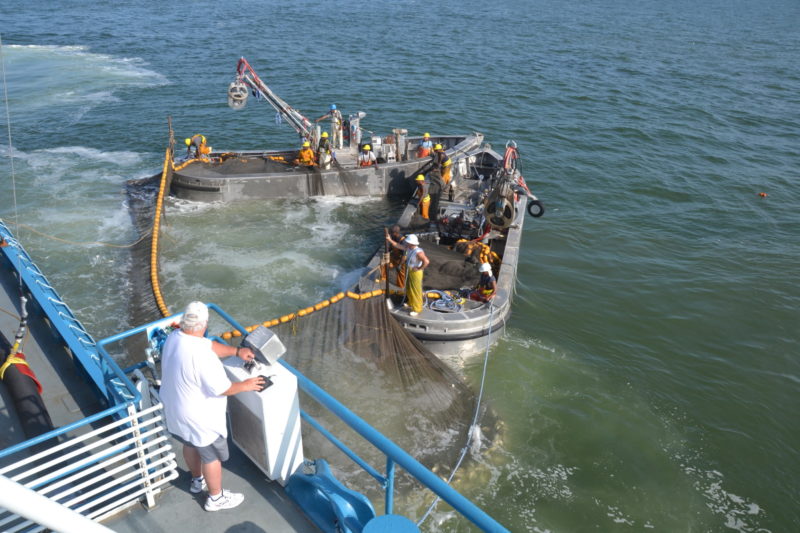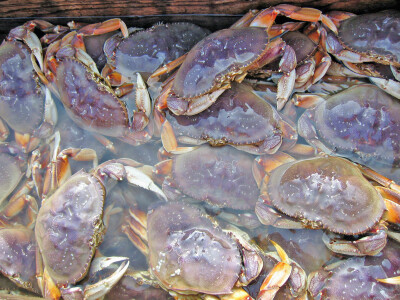Virginia’s menhaden reduction fishery could be out of compliance with the Atlantic interstate management plan, and Omega Protein could be threatened with a shutdown of the fishery after a Thursday vote by regulators.
The Atlantic States Marine Fisheries Commission voted to accept its Menhaden Management Board’s recommendation that Virginia is out of compliance with the commission’s fishery management plan and its 51,000 metric ton annual catch limit in Chesapeake Bay.
Omega says its Reedville, Va.-based fleet works in ocean waters whenever possible, but with adverse conditions there and abundant fish in the bay, the company sought safer working conditions. The company also takes the position that the commission’s decision to cut the bay fishing cap 41 percent in 2017 was “an arbitrary figure that was not scientifically derived.”
The company has contended it is justified to continue fishing under an earlier 87,216 metric ton cap that was adopted by the Virginia General Assembly, which under Virginia law has the final say in managing the menhaden industry.
The commission’s referral now goes to the U.S. Department of Commerce, and “there’s an opportunity for stakeholders to comment” before any decision by Commerce Secretary Wilbur Ross, said Ben Landry, an Omega spokesman.
“We’ll just see what happens,” Landry said after the Thursday vote. “From our perspective, the standard has to be it (the fishing cap) is necessary for conservation of the resource.”
The company in September said it would cap its 2019 bay catches at 67,000 metric tons, about 20,000 less than Virginia’s cap. But the company’s announcement in September that it would continue its bay fishing pushed commissioners to the near-unanimous vote, said Paul Eidman, a New Jersey recreational fishing charter captain with the conservation group Menhaden Defenders.
“That was looked at as, ‘What are you doing, making up your own rules?’ It was a very cocky move,” said Eidman. “If they can do this, what is the point of having (an interstate) management plan?”
The menhaden board issued its recommendation Monday at the commission’s annual meeting week in New Castle, N.H., and the full board approved the finding of non-compliance during its voting session Thursday morning. The commission will next submit its Virginia noncompliance referral in a letter to the Commerce Department for review by Ross.
“That will be the interesting part,” said Eidman. Ross could move to enforce the commission’s demand that Virginia and Omega abide by the 51,000 metric ton cap — or take a position that Virginia is acting within state rights.
The commission vote came after months of pressure from groups like the American Sportfishing Association and Coastal Conservation Association, and the Chesapeake Bay Foundation.
In mid-September Omega announced it would continue fishing in the bay, and “exceed the ASMFC’s arbitrarily low and unscientific cap recommendation on harvest in the bay for the 2019 season,” while staying below the cap under Virginia law. The company will comply with the existing bay cap codified in Virginia law.
In 2012 Omega officials and Virginia lawmakers agreed to adjust the state’s cap down 20 percent to 87,216 metric tons is response to commission concerns that menhaden could be subjected to overfishing coastwide.
After a 2015 assessment showed menhaden were not subject to overfishing, the commission has “increased the quota three times, (but) the bay cap has never been concurrently increased,” according to the company. The commission’s 2017 move to lower the cap to 51,000 metric tons was based on the average bay harvest over the previous five years.
“Taking a multiyear average and making that average the maximum allowable harvest removes necessary flexibility from the fishery, since it fails to provide for where fish are located and fluctuating weather conditions season-to-season,” the company contends.
The East Coast recreational fishery for striped bass is a big motivator for activists, who contend Chesapeake Bay bass numbers are down because of menhaden harvesting. But NOAA has been unable to directly quantify whether the “local depletion” that critics warn of is having that effect in a region beset by water quality and other issues.
“The Chesapeake Bay fishery is basically on hospice,” said Eidman. “Striped bass, oysters, blue crabs are all in trouble.”







